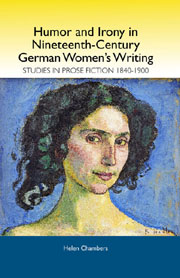Book contents
- Frontmatter
- Contents
- Acknowledgments
- Introduction
- 1 Annette von Droste-Hülshoff and Ida Hahn-Hahn: Overcoming Seriousness?
- 2 Ottilie Wildermuth and Helene Böhlau: Harmless Humor or Subtle Psychology?
- 3 Marie von Ebner-Eschenbach: Satire, Physical Comedy, Irony, and Deeper Meaning
- 4 Ada Christen and Clara Viebig: Laughter and Pain in the World of Work
- 5 Isolde Kurz and Ricarda Huch: The Humor of Skeptical Idealism
- Conclusion
- Works Cited
- Index
1 - Annette von Droste-Hülshoff and Ida Hahn-Hahn: Overcoming Seriousness?
Published online by Cambridge University Press: 05 February 2013
- Frontmatter
- Contents
- Acknowledgments
- Introduction
- 1 Annette von Droste-Hülshoff and Ida Hahn-Hahn: Overcoming Seriousness?
- 2 Ottilie Wildermuth and Helene Böhlau: Harmless Humor or Subtle Psychology?
- 3 Marie von Ebner-Eschenbach: Satire, Physical Comedy, Irony, and Deeper Meaning
- 4 Ada Christen and Clara Viebig: Laughter and Pain in the World of Work
- 5 Isolde Kurz and Ricarda Huch: The Humor of Skeptical Idealism
- Conclusion
- Works Cited
- Index
Summary
Es fehlt mir allerdings nicht an einer humoristischen Ader
ANNETTE VON DROSTE-HÜLSHOFF'S reputation is assured as the most eminent German female literary talent of the nineteenth century and it rests on a small body of poetry and prose, in which critics see the powerful expression of a nervous and tormented sensibility. The atmospheric evocation of nature that is fraught with uncanny forms and forces is central to her art. Marcel Reich-Ranicki's characterization of her as “diese[r] stille[n] und schwermütige[n], diese[r] düstere[n] und dämonische[n], diese[r] wunderliche[n] und letztlich wunderbare[n] Dichterin” is typical of this limited view of her life and work. It overlooks the significance of both humor and irony in Droste's writing. Her keen sense of humor has frequently been noted with reference to her letters, indeed, Ricarda Huch maintains it is directly linked to her serious and melancholy character:
Wie viele Menschen, die im Grunde sehr ernst sind und zur Schwermut neigen, hatte sie einen ausgeprägten Sinn für das Komische und war immer voll von belustigenden Einfällen.
The significance of humor and irony in her poetry was first commented on by Clemens Heselhaus in his discussion of the “Heidebilder” and Angelika Arend returns to and elaborates this discussion by identifying “structures of contrast” and “self-ridicule” as characteristics of a cycle of poems predicated on a pervasive sense of ambivalence. Arend links this to Preisendanz's notion of humor as “eine Integrationsform” in later realist writing that creatively bridges the gap “between the mode of presentation and the nature of the reality presented.”
- Type
- Chapter
- Information
- Humor and Irony in Nineteenth-Century German Women's WritingStudies in Prose Fiction, 1840–1900, pp. 13 - 52Publisher: Boydell & BrewerPrint publication year: 2007



